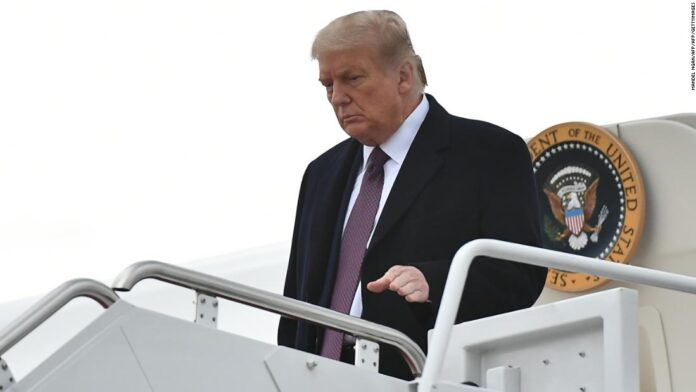Hours later, just after 1 a.m. Friday morning on the East Coast, Trump announced that both he and first lady Melania Trump had tested positive for Covid-19. That diagnosis made Trump’s strategy of changing the subject in these final 32 days before the election from Covid-19 to, well, anything else, totally impossible.
Trump will now be forced to quarantine for two weeks, taking him off the campaign trail and likely forcing the rescheduling — if not outright cancellation of, at least, the second presidential debate, which was set for October 15 in Miami, Florida. (The lone vice presidential debate is on the schedule for next Wednesday in Salt Lake City; Vice President Mike Pence tested negative for Covid-19 on Friday morning, according to his office.)
That, in and of itself, is a major blow to a President who is a) trailing former Vice President Joe Biden in national and swing-state polling and b) views his campaign rallies — large, raucous affairs — as the lifeblood of not just his campaign but his presidency. Despite the ongoing virus threat, Trump had increased the frequency of his campaign travel over the last few months as he sought to reassure the country that fight against the virus was being won and that the time had come to move on to other issues — most notably, according to Trump from the podium, the violent protests happening in cities around the country.
Trump has also actively flouted best practices when it comes to slowing the spread of the virus. Despite guidance from the CDC — beginning in April — that mask-wearing is one of the only (and best) ways to combat Covid-19’s infectiousness, the President has not only expressed skepticism about the need to wear masks but has also mocked Biden for doing so.
This exchange, between Trump and presidential debate moderator Chris Wallace, from Tuesday night, typifies how Trump has approached mask-wearing:
Wallace: President Trump, you have begun to increasingly question the effectiveness of masks as a disease preventer. And in fact, recently you have cited the issue of — of waiters touching their masks and touching plates. Are you questioning the efficacy of masks?
Trump: No, I think that masks are OK. You have to understand, if you look — I mean, I have a mask right here. I put a mask on, you know, when I think I need it.
Tonight, as an example, everybody’s had a test and you’ve had social distancing and all of the things that you have to, but —
Biden: Just like your rallies.
Trump: — I wear masks when needed. When needed, I wear masks.
Wallace: OK, let me ask —
Trump: I don’t have — I don’t wear masks like him. Every time you see him, he’s got a mask. He could be speaking 200 feet away from them and he shows up with the biggest mask I’ve ever seen.
And according to the pool reporter traveling with Trump to and from the debate, “all family members who entered without a mask, members of his administration and other guests were not wearing masks.” A doctor affiliated with the Cleveland Clinic approached the group offering masks if they did not have them. No one in the group put on a mask. In addition, former New Jersey Gov. Chris Christie said on ABC News Friday morning that “no one was wearing masks in the room when we were prepping the President during that period of time, the group was about 5 or 6 people in total.”
What the positive tests of the President and first lady prove (and, more accurately, re-prove) is that the coronavirus doesn’t care whether you believe in it or not. It infects Democrats, Republicans and people who don’t follow or care about politics. Ignoring it or pretending it is getting better — in spite of data that suggests we have never, really, gotten over the first wave — doesn’t affect whether or not it can sicken you.
It was always a very debatable proposition as to whether Trump’s efforts to make this election about “law and order” or socialism or, well, whatever he tweeted that day would be successful amid the steady march of the virus in the country. (As of Friday morning, 7.3 million Americans had been diagnosed with Covid-19 and 208,000 had been killed by the disease). Poll after poll suggested that the virus and the economy, which has been heavily affected by the shutdowns and slowdowns caused by the virus, were (and are) the two most important issues in the country. And the early signs on Friday suggested that the economic recovery from the initial hit of Covid-19 had slowed; The economy added 661,000 jobs in September, with the unemployment rate stuck at 7.9%. (That’s the highest unemployment rate this late in a presidential election since at least 1948.)
The practical impacts of Trump’s diagnosis are serious. But the less-tangible impacts may be even more costly to a President who has banked his reelection on the idea that things are getting much, much better and doing so very, very quickly.
While Trump’s behavior — steady travel, lack of mask-wearing, exposure to lots and lots of people — always made him more likely than the average person to contract the disease, the fact that he now has it will force a recalibration for many people. And that recalibration will center around this question: If the President of the United States can get Covid-19, what does that mean for my chances of getting it?
That uncertainty — and the anxiety it causes — is powerful. The virus, which has now been with us for the better part of six months, feels more real and more threatening for many Americans today than it has in many months. It’s managed to sicken the most powerful and well-protected person in the country. How people react to the new-found freshness of the threat — even if the threat remains roughly the same as it did prior to Trump’s diagnosis — is an X factor in the election, particularly given that we are less than five weeks away from the actual vote.
What we do know is that Trump’s attempt to make these final weeks of the election about something other than the coronavirus failed the second he got his positive test back. Cable news will cover his illness — and the people he came into contact with and whether they are also sick — wall to wall for weeks. While Covid-19 was the lead story for most news outlets on most days for the last few months, it is likely to become the ONLY story for the foreseeable future.
In short: Everything Trump tried to avoid in the stretch run of the 2020 race is now coming to pass. And it’s all because of him (and his positive test).









